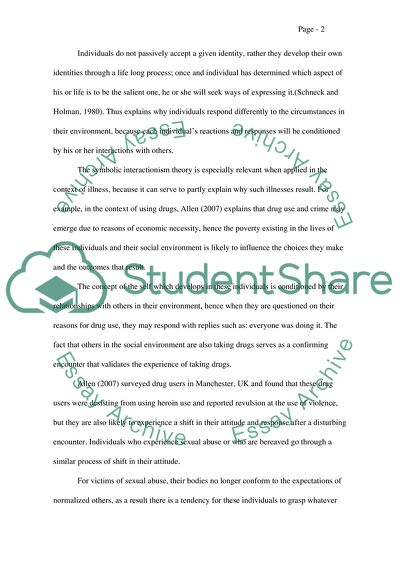
- Home
- Free Samples
- Premium Essays
- Editing Services
- Extra Tools
- Essay Writing Help
- About Us
- Studentshare
- Subjects
- Miscellaneous
- Symbolic Interactionism
Symbolic Interactionism - Essay Example

- Subject: Miscellaneous
- Type: Essay
- Level: Ph.D.
- Pages: 4 (1000 words)
- Downloads: 0
- Author: aiden34
Extract of sample "Symbolic Interactionism"
Blumer even goes so far as to state that society gains its only reality in the moments of interaction that take place between individuals, as a result the “world of reality” exists only in “human experience”, hence it would be a mistake to assume that the reality of the empirical world is fixed or immutable. (Blumer, 1969:22-23). Symbolic interactionism is therefore a theory that focuses on the impact of the social environment upon an individual based upon the manner in which the individual constructs reality based upon his or her interactions with others.
There is a process of self monitoring that goes on continuously within an individual and it is this factor that regulates the sensitivity of an individual and his or her willingness to change or modify behavior in accordance with societal norms and the desired presentation of the self.(Mahoney, Madrigal and Howard, 1999). Individuals do not passively accept a given identity, rather they develop their own identities through a life long process; once and individual has determined which aspect of his or life is to be the salient one, he or she will seek ways of expressing it.
(Schneck and Holman, 1980). Thus explains why individuals respond differently to the circumstances in their environment, because each individual’s reactions and responses will be conditioned by his or her interactions with others. The symbolic interactionism theory is especially relevant when applied in the context of illness, because it can serve to partly explain why such illnesses result. For example, in the context of using drugs, Allen (2007) explains that drug use and crime may emerge due to reasons of economic necessity, hence the poverty existing in the lives of these individuals and their social environment is likely to influence the choices they make and the outcomes that
...Download file to see next pages Read MoreCHECK THESE SAMPLES OF Symbolic Interactionism
Sociology Theory of Symbolic Interactionism
Symbolic Interactionism Theory
Symbolic Interactionism in Healthcare
Symbolic Interactionism in Police Culture
The Theory of Symbolic Interactionism
Using the Symbolic Interactionism Communication Theory
Sociological Theory of Symbolic Interactionism
Symbolic Interactionism and Bourdieu's Theory

- TERMS & CONDITIONS
- PRIVACY POLICY
- COOKIES POLICY